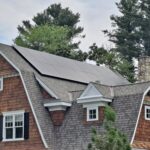In the race to pass a scaled down climate bill this year, it looks like renewables, like solar and wind, didn’t make the cut. However, home energy efficiency and incentives for electric and natural gas vehicles may still manage to get a piece of the funding. $900 million will also go to the Land and Water Conservation Fund to expand national parks, repair damage to wildlife refuges, and other environmental projects. These proposed programs are now in front of the U.S. Senate as part of the Clean Energy Jobs and Oil Accountability Act.
The legislation, mainly in response to BP oil disaster, would lift the $75 million cap on damages paid to residents and businesses by oil companies after an oil spill. The bill’s $15 billion cost would be financed by raising the per barrel surcharge that oil companies will have to contribute to the Federal Oil Spill Trust Liability Fund.
HOME STAR, which is the energy efficiency component of the bill, is a two-year program that would offer energy efficiency incentives to homeowners. Homes now account for 20% of all energy use in the United States. This measure currently has bipartisan support and experts believe there is a good chance it will get passed as part of the legislation. In addition, lawmakers claim HOMESTAR can add up to a 150,000 new jobs.
HOME STAR may be better known to some people as “cash for caulkers”. The program includes three main components, two levels of home efficiency incentives and financing for home improvements. The Silver Star level is available for one year and offers rebates up to $3,000 toward energy efficiency and water conservation. In order to apply for rebates, residents must be working with an accredited contractor. The Gold Start level, on the other hand, is available for two years and provides up to $8,000 in rebates to homes that demonstrate efficiency improvements.
While the bill does not support renewable energy choices, such as solar and wind, it will promote green jobs, save US consumers money, and decrease the country’s addiction to foreign fossil fuels. HOME STAR has generated awareness to energy efficiency improvements, but a lot of people who were planning on making efficiency upgrades have been waiting until this measure gets approved. Efficiency contractors, in the meantime, have seen a rapid slowdown in their business as consumers eagerly anticipate HOME STAR’s passage.
Don’t get me wrong, I think a scaled down climate bill includes important provisions that will inch the country toward a more sustainable future. However, does it make sense to pass a slimmed down energy bill or wait until a more comprehensive energy legislation can be discussed? I think a comprehensive bill just didn’t have a reasonable shot in the short timeframe the Senate was working to get energy legislation through. I’m worried we could lose sight of the bigger goal by passing such narrow bill now. What do you think?








Pingback: Tweets that mention No Room for Renewables in Climate Legislation — BRIGHTSTAR SOLAR -- Topsy.com
Pingback: Installation of Western Massachusetts Solar Farm on Track — BRIGHTSTAR SOLAR
Thank you for your sharing. I am worried that I lack creative ideas. It is your article that makes me full of hope. Thank you. But, I have a question, can you help me?
I don’t think the title of your article matches the content lol. Just kidding, mainly because I had some doubts after reading the article.
Thanks for sharing. I read many of your blog posts, cool, your blog is very good.
Your article helped me a lot, is there any more related content? Thanks!
Can you be more specific about the content of your article? After reading it, I still have some doubts. Hope you can help me.